| All Artists: Ruth Lomon, R. James Whipple, William [1] Thomas McKinley, Stephen Suber, Gerard Schwarz, Vladimir Valek, Czech Radio Symphony Orchestra (Bratislava), Czech Radio Symphony Orchestra (Pilsen) Title: MMC New Century, Vol. 12 Members Wishing: 0 Total Copies: 0 Label: Mmc Records Release Date: 4/25/2000 Genre: Classical Styles: Forms & Genres, Concertos, Symphonies Number of Discs: 1 SwapaCD Credits: 1 UPC: 761594207229 |
Search - Ruth Lomon, R. James Whipple, William [1] Thomas McKinley :: MMC New Century, Vol. 12
 | Ruth Lomon, R. James Whipple, William [1] Thomas McKinley MMC New Century, Vol. 12 Genre: Classical
|
Larger Image |
CD DetailsSimilar CDs
|
CD ReviewsReview from Sept/Oct 2000 edition of FANFARE Magazine Stephen Suber | Hammond, LA United States | 09/28/2000 (5 out of 5 stars) "(This review was provided by one of the composers on this CD, who gave it a 5-star rating which perhaps might be biased)From the September-October 2000 (Vol 24, No. 1) Issue of Fanfare Magazine ("The Magazine for Serious Record Collectors"), p. 361:LOMON Bassoon Concerto. WHIPPLE Concerto for Autumn Mood. McKINLEY Night Music. SUBER Enchantments. Gerard Schwarz, Vladimir Valek, cond; Czech Radio Symphony Orchestra; Deborah Greitzer (bn); Michael Rossi (t sax); David Evenson (pn) - MMC 2072 (62:06)This is Volume 12 of MMC's indispensable anthology of world-premiere recordings of 20th-century North American music. At the core of this new release is a work by the founder of MMC, William Thomas McKinley, one of the few composers who have successfully brought jazz and classical music together, and to such an extent that you can no longer find where one ends and the other begins. Night Music is a reworking of the 1988 score Rhapsody for Solo Tenor Sax and orchestra, originally intended for legendary saxophonist Stan Getz. The work came late in Getz's all-too-short life, and McKinley subsequently decided to rewrite the score to take into account the exceptional skills of Michael Rossi, the remarkable soloist in this highly enjoyable performance. The score still contains elements of that "cool" style that Getz made his own, and toward the end there are snatches of tunes that Getz made with a virtuoso cadenza at the center of the one-movement format.Canadian-born Ruth Lomon has enjoyed a multifaceted career as pianist, teacher, and composer; the Bassoon Concerto dating from a few intervals in her other activities during the years 1978 and 1979. It is an atonal composition that avoids serialism but is otherwise in direct descent from the mood of Second Viennese School. It is a three-movement concerto, the orchestra often restricted to a backdrop of colors against which the soloist is heard. The listener will have to come to terms with this score, and the unusual and stark orchestral harmonies have caused some anxiety in the Czech orchestra. Though it is not a bassoon showpiece, it must be incredibly difficult to perform, the massive lea[s around the instrument a feat that the double-reed brigade does not relish. Deborah Greitzer has been principal bassoon for leading orchestras in a number of countries, including the Jerusalem Symphony and the Italian Radio and Television Orchestra. Presently a member of the Music Faculty at St. Mary's College in Maryland, she produces a nice, woody tonal quality, her nimble fingers mastering their severe test.Greitzer is also the soloisit in James Whipple's Concerto in Autumn Mood. Working in Pittsburgh as a bassoonist, composer, arts administrator, and artistic director of the Renaissance City Winds, Whipple composed the work for bassoon and string quartet in the 1970's. Two further versions followed, the first expanding the quartet to full orchestral strings, the second further still to full orchestra. It is the last of these versions that here receives its first recording. In one quite short movement, divided into sections of different mood, it is a tonal work of immediate accessibility. Swirling in the background is the autumnal wind, with the soloist sometimes becoming directly involved; but for the greater part is is content to sing a lyrical song against the active strings. The youngest member of this group of composers, Stephen Suber, was born in New Mexico, completing his education in the late 1970s at Indiana University. He has since worked principally as a composer in many fields of contemporary music. Enchantments, composed for solo piano and orchestra, dates from 1992 and was commissioned by the Louisiana Music Teachers Association. As with so many recent works, the music does not conveniently fall into the heading of atonal or tonal music, but occupies a role that the composer sees fit at any moment. The furious activity of the soloist iin the outer movements gains respite in "The Enchanted Canyon," the scene-painting central movement of a duration almost equal to the remainder of the score. The composer describes the inspiration as having come from a dream in which he wandered into a canyon where suddenly the colors of the walls grew in intensity. That image is portrayed in a long and gradual crescendo of immense grandeur. The soloist who provides Suber's myriad of notes, David Evenson, is a pupil of Jorge Bolet, and currently heads the Department of Music at Southeastern Louisiana University, combining this position with a recital and concert career. Financial restraints take many record labels to orchestras in the former Soviet Union, many of modest quality and often with little grasp of the music they are trying to record. Fortunately the Czech Radio Symphony is of a quite high standard, and, after they have survived the difficult Lomon work, sound reasonably confident in the remainder of the disc. They do, of course, have the safe hands of Gerard Schwarz to guide them through the performances, though it is Valek, who never gets a mention in the accompanying booklet, who obtains the most colorful playing in Night Music. The bassoon is such a dominant instrument in Lomon's concerto that it must be difficult to successfully balance it with the orchestra. Here I feel the engineer has erred on the side of over prominence, the microphone so close that we are aware of the action of the keys. The piano/orchestra relationship, which is much more problematic, is ideally handled in the Suber, the work reaching a suitably cataclysmic conclusion. To provide a balanced disc of music from differing composers must pose problems for MMC, and I would not envy the task. Her I wonder whether it was well thought through, as the works are of such a differing style and lineage that it proves an uneven musical experience.David Denton"
|

 Track Listings (8) - Disc #1
Track Listings (8) - Disc #1

